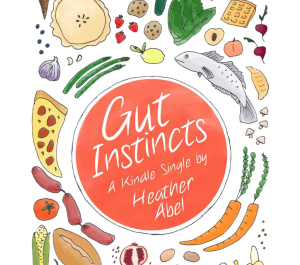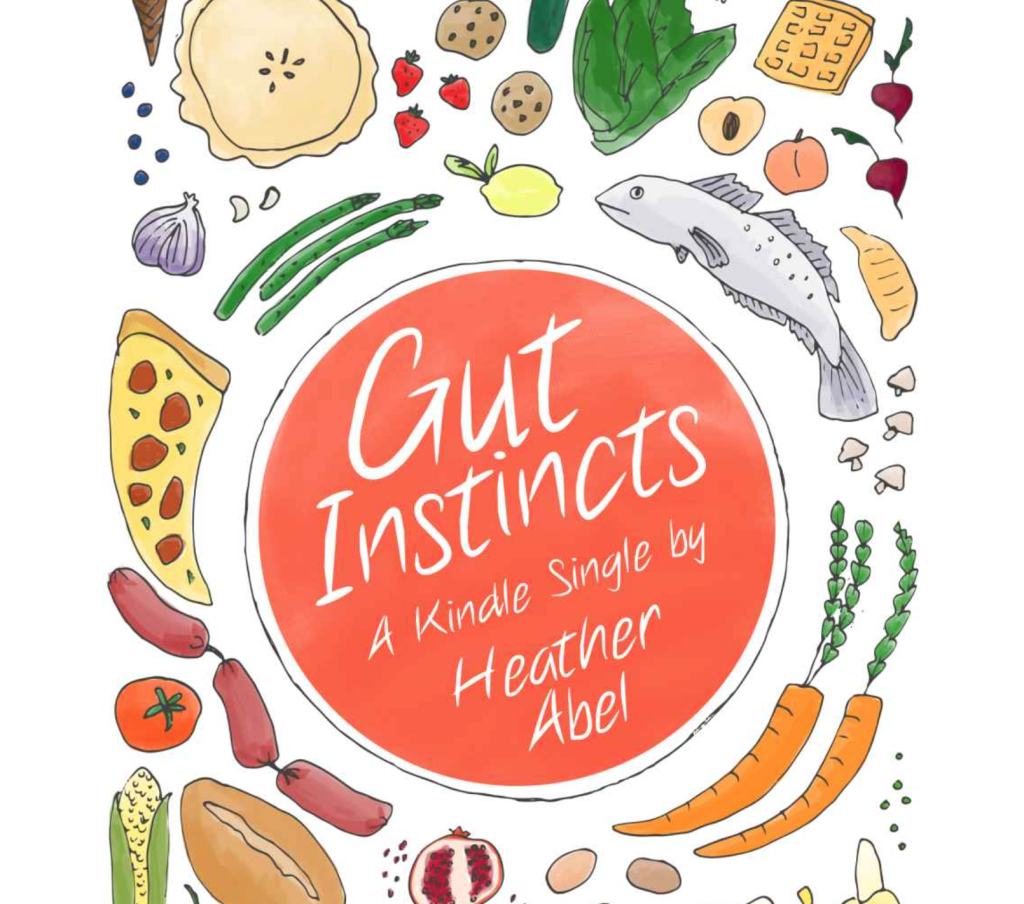
Co-Editor-in-Chief and Creative Writing Director Luis Jaramillo, MFA ‘01, talks with Heather Abel, MFA ‘01, about her recent Kindle Single, Gut Instincts: Dispatches From the Wide-Open Space Between Sickness and Health. Jaramillo and Abel discuss celiac disease, capitalism and the medical industry, and what it’s like to write about your mother.
Along with being a personal story about celiac disease, this is also a story about how the medical community began to recognize and diagnose celiac disease again in the United States. This contributed to the rise of the gluten-free diet and industry, so much so that as you write, “nearly a third of Americans avoid gluten.” This is pretty shocking. What else surprised you in your research?
For forty years, the American medical establishment basically ignored celiac disease, even while European doctors continued researching and diagnosing it. This continues to shock me even though I know that medical research in this country is linked to pharmaceutical money and that diseases without a pharmaceutical cure, such as celiac, get ignored. The myth of American superiority is so pervasive here. We like to believe that we have the newest and best of everything. It’s still hard for me to wrap my head around the fact that if I’d been born in Italy, I never would have gotten as sick as I did. I wouldn’t have lingering symptoms. The entire trajectory of my body would be different.
You tie together so many threads in this piece. How did you decide which to emphasize when?
Well, I had a lot, perhaps too much, that I wanted to cram into this essay, and even though I didn’t want to write a traditional illness narrative (I got sick; nobody understood; then they did; I got better or not), I decided to rely on chronology to organize the sections. It begins with my diagnosis in 2000 and ends in 2014. This way, I could show the metamorphoses of two relationships that changed for the better over time — my relationship with my mom and my relationship with uncertainty.
One story line I especially liked was how you got sucked into the world of blogs about celiac disease. Your interest in glutenfreegirl.com and celiachcicks.com evolves quite a bit. Can you say a bit about that?
I’m a pretty voyeuristic person. I like eavesdropping. I like talking walks at night and looking into people’s houses. Back when people wrote things on paper, I loved finding a crumpled up sheet of notebook paper on the ground. So when blogs first appeared, I was a natural audience. Here were all these people exposing such intimate but mundane details as what they ate for dinner. And I wanted to know what everyone ate for dinner. My love of blogs soon soured, though, because of the imposed perkiness, the forced optimism. Some of this is the perfomative nature of the internet, the self we’re all projecting onto the screen. But some of this is because so many bloggers decided to monetize their intimate mundanities, and to do that, they had to alter their narratives to please advertisers. Now I pretty much avoid all gluten-free bloggers, unless I have a particular question or recipe I need to find. I’m sure I miss out on a lot of helpful information — and I definitely missed out on a powerful potential for publicity for my essay by critiquing these blogs — but I actually feel calmer with less info, fewer perky stories.
This is also a story about how insidious capitalism is, everywhere you turn as a patient and reporter. Do you have any further thoughts about this?
Revolution! But short of overthrowing capitalism, I think exposing its reach is really important. It’s crucial to point out over and over how all of our medical information, the way it’s researched and the way it’s presented, is influenced — even skewed — by the scramble for corporate money. I hope I contributed to that exposition, and I also want to say how grateful I am to the doctors and practitioners and bloggers who are slogging through the information and trying to make sense of it for the rest of it — even if they themselves are skewed by the forces of capitalism.
What did you learn about the food industry?
I don’t think I learned much about it, other than that I have a lot to learn about it. I did learn a lot about food fads and the forces that bring certain fads to the forefront of our culture.
So much of our experience of feeling taken care of is tied to certain foods. You write about your relationship to your mother in this piece. What was that experience like?
I recently was told about an essay about celiac by a young woman who complained that her mother was so controlling. She hated how her mother micromanaged every bite she took. When I learned this, I wrote an email to my mom saying, “Motherhood: damned if you do; damned if you don’t.” Which is certainly something I can relate to vis a vis my own kids. In my essay, I wanted to write about my anger at my mom for not diagnosing me, not because I think I was right to be so angry, but because I think that anger is often part of the experience of a chronic disease. As long as I was committed to the idea of certainty in illness, I was going to be angry. My mom, however, hated reading about my anger, probably as much as she hated experiencing it. She didn’t see the larger context — how I let go of this anger and felt really grateful to her — on the first read. So we talked a lot about those years, which was a good thing for us to do. But even through her initial disappointment, she’s been supportive of this essay in a lovely way.
You write about the advice you were getting on celiac: “It was beginning to feel a little absurd, how little anyone knew and how adamantly everyone insisted.” This seems to be a recurring theme, the fundamental unknowability of pretty much everything. Was it always your intention to write about this?
When I set out to write this essay, it was because I felt strongly that I had one thing to say that wasn’t being discussed in any of the discourse on celiac I was reading. And that was the unknowability, the uncertainty of such an illness. Blogs, for all the capitalist reasons we talked about earlier, are often ridiculously sure-footed and certain. As are doctors and alternative practitioners. Everyone’s contradicting each other. Everyone’s claiming certainty. And nobody was pointing out how strange it felt to be a patient in this echo chamber.
You’ve written this piece and an essay on celiac for Slate. Would you want to write a book about the subject?
I’m not sure I have more than the 14,000 words I already wrote about celiac, but I recently wrote about feeding arsenic-laced rice to my kids and it made me interested in writing a collection of essays about uncertainty, especially the ways we live with uncertainty in this age of rising seas and rising auto-immune diseases and tidal waves of information that is both contradictory and mesmerizing.
How did you come to publish this piece as an Amazon Single? What was the process like?
I wrote the essay at 14,000 words and asked friends where I could possibly publish something at that length. Someone suggested Kindle Singles and I approached them. The process was great. I worked with astute editors and a talented cover artist. It’s been interesting to have a piece that can only be read on certain newish technology or with a specific app. There’s a wide swath of the public that regularly reads Kindle Singles and have downloaded my piece, but I’ve had to explain how to find it to some of my family — and I wouldn’t have understood how to do this myself before I published a Kindle Single.
What have the responses to your pieces been?
I’ve heard from people with celiac, people with gluten sensitivity, people with undiagnosed disorders, people with mothers. The response that I keep thinking about is from a woman who wrote to tell me how much the piece resonated. She said that her son was diagnosed with celiac at 10 and for years before his diagnosis he would tell her, “I just don’t fit in anywhere in the world.” I know that feeling so well from life pre-diagnosis. It’s remarkable how an undiagnosed autoimmune illness — a systemic bodily assault — can cause a person to feel not only sickly but other, floating a bit outside of the healthy, chattering world. I’m really glad he’s diagnosed.


Comments are closed.